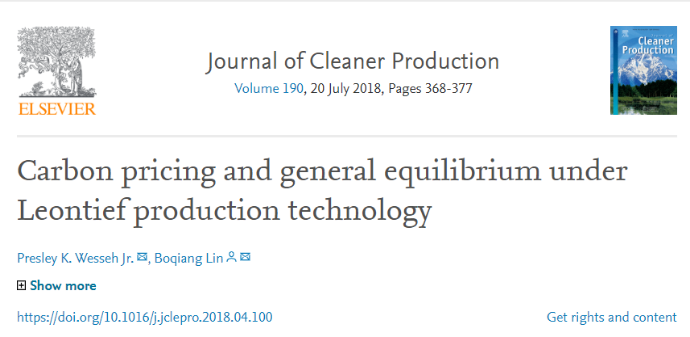
题目:Leontief生产技术下的碳定价与一般均衡(Carbon pricing and general equilibrium under Leontief production technology)
作者:Presley K. Wesseh Jr.,林伯强*
期刊:清洁生产(Journal of Cleaner Production)
详细:190卷,2018年7月,368-377页
DOI:https://doi.org/10.1016/j.jclepro.2018.04.100
文献导读:
气候变化和全球气温上升引发了人们的担忧。近年来,旨在提高环境标准的相关治理政策越来越多。碳排放和温室气体(GHG)是学界讨论最多的环境议题,人们普遍认为减少温室气体排放对于缓解气候变化是必要的。文章指出,有必要研究减排政策如何影响社会福利和环境质量。然而,迄今为止研究人员尚不清楚碳减排的具体机制。当前国际上最受欢迎的一种减排机制是征收碳税,也即对每单位CO2征收固定费用的一种政策。碳税已被学界证明具有成本效益,企业会选择在减排成本低于碳税成本的情况下减少排放。但是,如何设计一个最优碳税是减排议题中十分复杂的难题。人们普遍承认,大多数地区实施的碳税都不是最优的。
文章采用Leontief生产模型,并结合可计算的全球贸易一般均衡模型,定量测度碳排放缓解政策对社会福利和环境绩效的影响。实证分析的一个关键环节是,计算环境外部性完全内生化的最优碳税。文章指出,Leontief生产技术假定投入和排放之间是无法进行替换的,只有通过改变技术才能减排。
研究结果发现,第一,与高收入国家相比,征收碳税给低收入国家的工业生产的负向影响较小。第二,征收碳税对高收入国家的服务业具有促进作用,而对低收入经济体服务业具有抑制作用。另一方面,如果考虑环境效应,那么除了低收入国家以外,所有地区都能从碳税政策中获益。准确地说,对中国、高收入国家、中低收入国家、中高收入国家和美国实施碳税政策,将分别带135.6%、27.9%、16.7%、15.1%和12.2% 的福利收益。相反,碳税政策会导致低收入国家福利损失37.5%。总的来说,征收碳税可以从环境效益和资源转移效应两个维度增加社会福利收益。
Abstract:
Comparing temperature and emissions data does not clearly show a relationship between the two variables. Going further, this study combines Leontief production technology with a computable general equilibrium model of global trade in order to quantitatively test the implications of mitigation policies for welfare and the environment. We compute optimal emissions taxes and show that administering carbon fees reduces environmental damages by nearly 50%. However, there is a tradeoff effect on production which calls for caution when implementing environmental policies. In general, environmental benefits and resources shifting due to carbon taxes lead to welfare gains.
Keywords: Environmental pollution; Optimal emissions charges; Industrial production; Welfare
 厦大总机:0592-2180000
|
地址:福建省厦门市思明区思明南路422号
|
邮政编码:361005
厦大总机:0592-2180000
|
地址:福建省厦门市思明区思明南路422号
|
邮政编码:361005